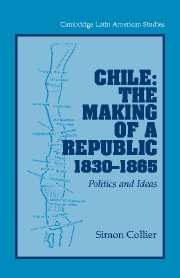Book contents
2 - The Conservative System
Published online by Cambridge University Press: 24 July 2009
Summary
The Liberals defeated in 1830 sometimes accused the Conservatives of having mounted a “colonial reaction.” The content of this rhetorical flourish was thin. It is more sensible to see the Conservative settlement as a fusion of the authoritarian legacy of the Spanish Empire with the outward forms, and increasingly much of the substance, of liberal, republican constitutionalism. Yet it is certainly true that political processes in Chile's early republic not only took place within but were partly dictated by the shape and form of the political system imposed by the Conservatives after 1830. The creation of a particularly strong presidency and the government's systematic manipulation of elections required justifications from the Conservatives (who obviously felt them to be necessary) and sharpened the determination of oppositions to reduce overwhelming executive power. It can be argued, in fact, that the nature of the political system helped in many ways to determine the main lines of political debate throughout the period, focusing Conservative minds on the issue of order and Liberal minds on the issue of liberty. In terms of political behavior, the defense of order sometimes led the government to act in a distinctly authoritarian manner, while the opposition (the Liberals, and after 1857–8, the Liberal-Conservative Fusion) was twice tempted into serious armed rebellion. None of this can easily be understood without knowledge of the political system – its constitutional basis, its institutional and administrative structure, and the techniques that successive governments used to keep the ship of state on the course fixed by the Conservatives after 1830.
- Type
- Chapter
- Information
- Chile: The Making of a Republic, 1830–1865Politics and Ideas, pp. 22 - 44Publisher: Cambridge University PressPrint publication year: 2003

